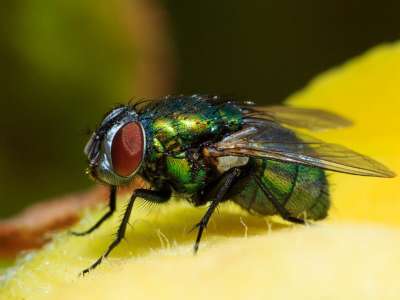Why Flies Die When They See Dead Flies

The world of insects is filled with fascinating behaviors, and flies are no exception. Have you ever wondered why flies seem to die when they encounter dead flies? It's a peculiar phenomenon that has captured the curiosity of many. In this article, we'll delve into the intriguing behavior of flies, explore whether flies can detect death, and unravel the mysteries behind this phenomenon.
Why Flies Die When They See Dead Flies
The Fascinating Behavior of Flies
Flies, those tiny airborne creatures that buzz around us, exhibit some peculiar behaviors that leave us scratching our heads. One of these behaviors involves their reaction to dead flies. You might have observed that flies often gather around deceased members of their own kind. This phenomenon has led scientists to question whether flies have a unique ability to detect death.
Can Flies Detect Death?
The idea that flies can detect death might sound like something out of a science fiction movie, but there's actually some scientific basis to this concept. Flies are known to communicate using pheromones, chemical signals that convey information to other flies. These pheromones play a crucial role in various fly behaviors, including mating, finding food sources, and even alerting other flies to danger.
The Role of Pheromones
Pheromones are the language of flies, and they use this language to navigate their world. When a fly dies, it releases specific pheromones that signal its demise. Other flies in the vicinity might pick up on these pheromones, and this could be the reason behind the seemingly morbid attraction flies have towards their deceased companions.
The Swift Demise of Flies
To understand why flies die so quickly, we need to consider their short lifespan and the challenges they face in their environment. Flies have a brief existence, often measured in days. During this time, they encounter predators, adverse weather conditions, and a constant struggle to find food. All these factors contribute to their rapid mortality.
Understanding Fly Vision
Flies have compound eyes, which provide them with a wide field of view but relatively low resolution. This unique visual system allows them to detect motion quickly and respond to fast-changing environments. However, it also means that their perception of finer details might be limited. This could influence their ability to differentiate between live and dead flies based solely on visual cues.
Attraction to Decomposition Odors
Flies have a strong association with the process of decomposition. They're attracted to the distinct odors released by decaying matter, which serves as a valuable food source for them. When a fly encounters the smell of decomposition, it's programmed to investigate further, and this behavior could extend to dead flies themselves.
Social Dynamics Among Flies
Flies are social insects, often seen gathering in groups. This social behavior might also play a role in their attraction to dead flies. The presence of deceased flies could trigger a social response among living flies, drawing them together and intensifying their interest in the deceased individual.
The Mystery of Death Perception
While we've explored potential explanations for why flies die when they encounter dead flies, the precise mechanisms behind this behavior remain a mystery. Researchers continue to study fly behavior and sensory systems to unravel the complexities of their perception.
Comparative Insights from Other Insects
To gain a broader perspective, scientists often compare fly behavior with that of other insects. This cross-species analysis helps identify patterns and commonalities in behaviors related to death detection and response.
Survival Implications
The behavior of flies around dead counterparts could have survival implications. It's possible that by detecting death and avoiding areas with deceased flies, living flies increase their chances of survival by minimizing exposure to potential dangers or diseases.
Environmental Cleanliness and Hygiene
Flies play a vital role in ecosystems by aiding in decomposition, which recycles nutrients back into the environment. However, their attraction to dead organisms also raises hygiene concerns, especially when it comes to human environments. Keeping spaces clean and free from decaying matter can help mitigate fly infestations.
Human Applications and Studies
Studying fly behavior isn't just a scientific curiosity; it has practical applications as well. In forensics, for instance, understanding how flies interact with dead bodies can provide crucial insights into the time of death in criminal investigations.
Curbing Fly Infestations
If you're dealing with pesky fly infestations around your home or business, there are several steps you can take to reduce their numbers. Proper waste management, sealing entry points, and using traps can all help control fly populations effectively.
Conclusion
The behavior of flies around dead flies is a captivating puzzle that highlights the intricate interplay between insect behavior, sensory systems, and survival strategies. While we've explored potential explanations, the exact reasons why flies die when they encounter deceased companions continue to intrigue scientists. As our understanding of insect behavior deepens, we may unlock new insights into the remarkable world of these tiny yet remarkable creatures. In conclusion, flies do not suddenly die when they come across dead flies. Their attraction to decaying matter, including deceased flies, is a result of their natural instincts to find suitable sites for egg-laying and larval development. This behavior is driven by their role in nutrient cycling and ecosystem maintenance.
- Comment
- Posted by Dayyal Dg.